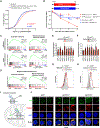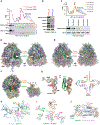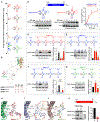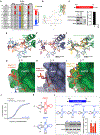Specific tRNAs promote mRNA decay by recruiting the CCR4-NOT complex to translating ribosomes
- PMID: 39571015
- PMCID: PMC11583848
- DOI: 10.1126/science.adq8587
Specific tRNAs promote mRNA decay by recruiting the CCR4-NOT complex to translating ribosomes
Abstract
The CCR4-NOT complex is a major regulator of eukaryotic messenger RNA (mRNA) stability. Slow decoding during translation promotes association of CCR4-NOT with ribosomes, accelerating mRNA degradation. We applied selective ribosome profiling to further investigate the determinants of CCR4-NOT recruitment to ribosomes in mammalian cells. This revealed that specific arginine codons in the P-site are strong signals for ribosomal recruitment of human CNOT3, a CCR4-NOT subunit. Cryo-electron microscopy and transfer RNA (tRNA) mutagenesis demonstrated that the D-arms of select arginine tRNAs interact with CNOT3 and promote its recruitment whereas other tRNA D-arms sterically clash with CNOT3. These effects link codon content to mRNA stability. Thus, in addition to their canonical decoding function, tRNAs directly engage regulatory complexes during translation, a mechanism we term P-site tRNA-mediated mRNA decay.
Conflict of interest statement
Figures






References
-
- Gallie DR, The cap and poly(A) tail function synergistically to regulate mRNA translational efficiency. Genes Dev 5, 2108–2116 (1991). - PubMed
-
- Garneau NL, Wilusz J, Wilusz CJ, The highways and byways of mRNA decay. Nat Rev Mol Cell Biol 8, 113–126 (2007). - PubMed
-
- Yi H et al., PABP Cooperates with the CCR4-NOT Complex to Promote mRNA Deadenylation and Block Precocious Decay. Mol Cell 70, 1081–1088 (2018). - PubMed
Publication types
MeSH terms
Substances
Grants and funding
LinkOut - more resources
Full Text Sources
Molecular Biology Databases

